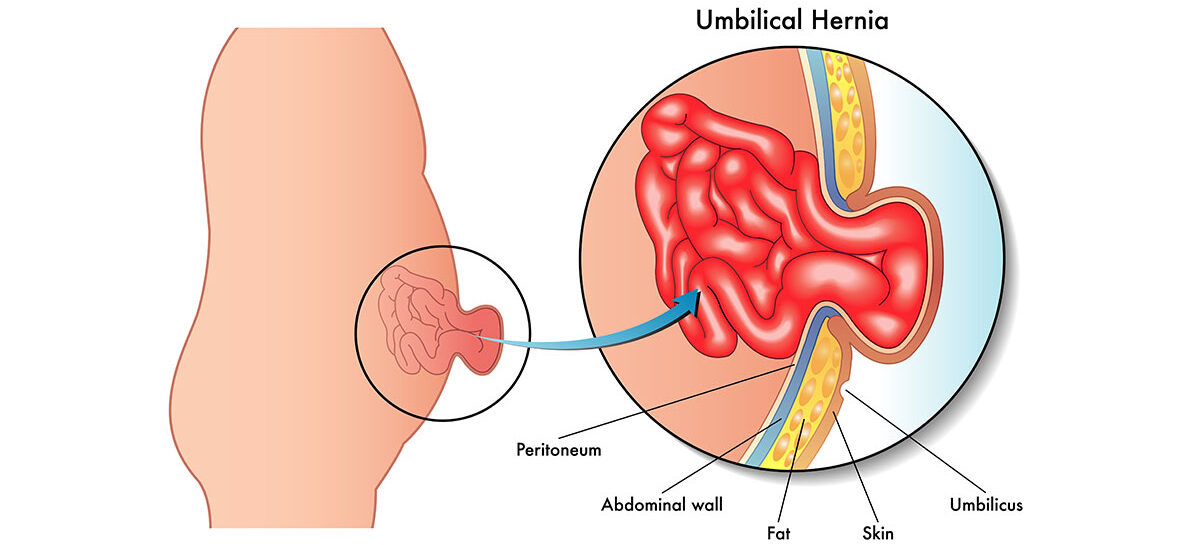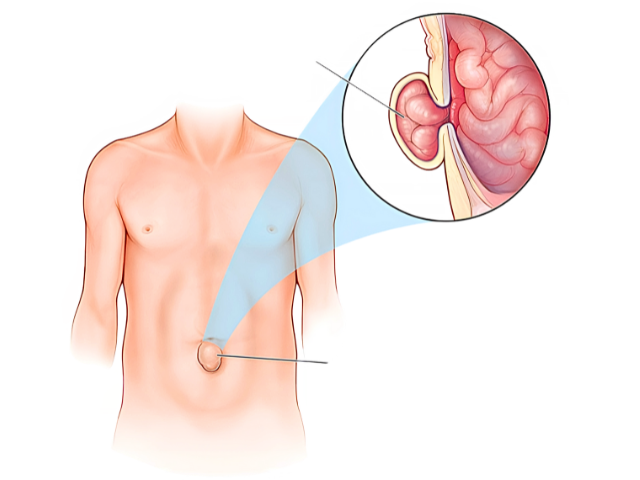Are you experiencing discomfort due to an umbilical hernia? At KK Virat Hospital, Karimnagar, our expert surgeons provide minimally invasive laparoscopic surgery for effective hernia repair. With advanced techniques and faster recovery times, we ensure the best treatment and care for our patients. Schedule a consultation today!
What Is an Umbilical Hernia?
An umbilical hernia occurs when part of the intestine protrudes through the abdominal muscles near the navel. It appears as a bulge and may cause discomfort, particularly when coughing, bending, or lifting objects. While common in infants, umbilical hernias can also develop in adults, especially due to abdominal strain.


Causes and Risk Factors of Umbilical Hernia
1. Age and Gender
- Infants are at higher risk due to weak abdominal muscles.
- Adults, particularly women, are more prone to umbilical hernias after multiple pregnancies.
2. Obesity
- Excess body weight puts pressure on the abdominal wall, increasing the likelihood of a hernia.
3. Pregnancy
- Stretching of the abdominal muscles during pregnancy can lead to muscle weakness and hernia formation.
4. Chronic Conditions
- Persistent coughing, constipation, or straining can weaken the abdominal wall.
- Previous abdominal surgeries may also increase the risk.
Symptoms of Umbilical Hernia
- Visible bulge near the navel, which may increase in size over time.
- Pain or discomfort, especially when bending or lifting.
- Swelling and tenderness in the affected area.
- Possible nausea or digestive issues if complications arise.
Diagnosis of Umbilical Hernia
Doctors at KK Virat Hospital use advanced diagnostic tools, including:
- Physical Examination – Checking for bulges and swelling.
- Ultrasound – Imaging test to assess the hernia’s size and location.
- CT Scan or MRI – Used for complex cases requiring detailed visualization.
- Blood Tests – To detect infections or complications.
Surgical Treatment for Umbilical Hernia
Surgery is the only definitive treatment for an umbilical hernia. There are two main surgical techniques:
1. Open Surgery (Herniorrhaphy)
- A single large incision is made near the hernia site.
- The protruding tissue is repositioned, and the abdominal wall is reinforced with sutures or mesh.
- Requires a longer recovery period than laparoscopic surgery.
2. Laparoscopic Surgery (Minimally Invasive Procedure)
- Three small incisions are made instead of one large cut.
- A laparoscope (small camera) guides the surgeon.
- The hernia is repaired using mesh reinforcement.
- Faster recovery, reduced pain, and minimal scarring.
Which Surgery Is Best for Umbilical Hernia Repair?
Laparoscopic surgery is highly recommended due to:
- Smaller incisions and reduced post-operative pain.
- Faster recovery time compared to open surgery.
- Better cosmetic outcomes with minimal scarring.
- Lower risk of infection and complications.
- More precise placement of surgical mesh, reducing recurrence rates.
Can Umbilical Hernia Be Treated Without Surgery?
No, surgery is the only permanent solution. However, non-surgical methods may help manage symptoms:
- Avoiding Smoking – Smoking weakens connective tissues, increasing hernia risk.
- Abdominal Binders – Temporary relief but not a cure.
- Lifestyle Adjustments – Maintaining a healthy weight and avoiding heavy lifting.
- Pain Management – Medications for discomfort.
How to Prepare for Laparoscopic Umbilical Hernia Surgery?
- Complete medical evaluation to ensure fitness for surgery.
- Follow fasting guidelines before surgery.
- Avoid blood thinners and certain medications.
- Quit smoking to promote faster healing.
- Wear loose, comfortable clothing on the day of surgery.
- Arrange for post-surgery transportation and care.
Recovery After Umbilical Hernia Surgery
Most patients recover within 2-3 weeks, with full recovery taking about 4-6 weeks. Follow these tips:
- Rest and avoid strenuous activities.
- Follow dietary recommendations – Eat fibre-rich foods to prevent constipation.
- Take prescribed pain medications as needed.
- Keep the surgical site clean and dry.
- Attend follow-up appointments for monitoring.
Possible Complications of Umbilical Hernia Surgery
Although rare, complications may include:
- Infection at the incision site.
- Hernia recurrence (low risk with mesh reinforcement).
- Minor swelling or bruising.
- Adverse reaction to anaesthesia.
- Chronic pain (rare but possible).
Why Choose KK Virat Hospital for Umbilical Hernia Treatment?
- Experienced Laparoscopic Surgeons with high success rates.
- State-of-the-art facilities for minimally invasive procedures.
- Faster Recovery & Minimal Scarring compared to open surgery.
- Comprehensive Post-Surgical Care ensures safe and smooth healing.
Your Health, Our Priority – Book Your Consultation Today!
If you or a loved one is suffering from an umbilical hernia, don’t wait! Visit KK Virat Hospital, Karimnagar, for expert laparoscopic hernia treatment. Contact us now to schedule an appointment and start your journey toward a pain-free life!
- Call Us Directly: Get in touch with our medical coordinators to schedule an appointment with an expert urologist.
- Direct Visit: You can visit our hospital directly by carrying your previous medical records if you have a medical history. However, admission will be based on the doctor’s recommendation.
Is laparoscopic umbilical hernia surgery safe?
Yes, laparoscopic surgery is safe and highly effective, with a low risk of complications and faster recovery than open surgery.
How long does umbilical hernia surgery take?
The procedure usually takes 30-60 minutes, depending on complexity.
When can I return to work after surgery?
Most patients can resume light activities in 1-2 weeks, but avoid heavy lifting for at least 4-6 weeks.
What foods should I eat after surgery?
Eat fibre-rich foods like fruits, vegetables, and whole grains to prevent constipation.
Can an umbilical hernia recur after surgery?
Recurrence is rare, especially with mesh reinforcement and proper post-surgical care.
How soon can I exercise after surgery?
Light walking is encouraged after surgery, but avoid strenuous activities for at least 4-6 weeks.
Does an umbilical hernia always require surgery?
If the hernia is small and painless, monitoring may be an option. However, most cases eventually require surgical repair.
What happens if an umbilical hernia is left untreated?
It may enlarge and lead to complications such as bowel obstruction or strangulation, requiring emergency surgery.


